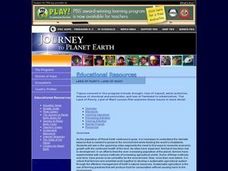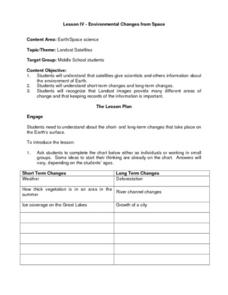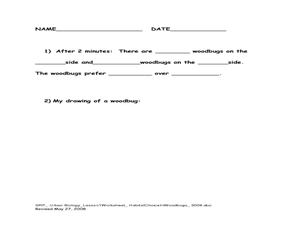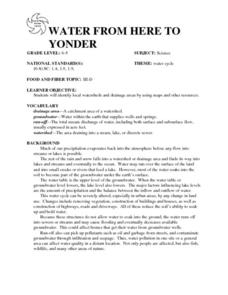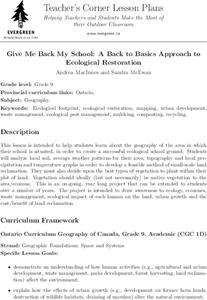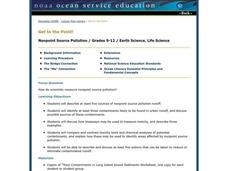Chicago Botanic Garden
Are You Bigfoot?
Scholars independently explore several websites to calculate their ecological footprint. Using their new found knowledge, they answer six short-answer questions and take part in a grand conversation with their peers about how our...
Chicago Botanic Garden
Calculating Your Ecological Footprint
You can lower your ecological footprint by recycling! Lesson four in this series of five has individuals, through the use of a computer, calculate their ecological footprints. Through discussions and analysis they determine how many...
Curated OER
Water Quality and Watersheds: A GIS Investigation
Requiring more than one class period, this resource takes earth science learners on a journey through a watershed. Using ArcGIS Explorer, an online geographic information system, they view maps of watersheds and surrounding landscapes....
Curated OER
Gwynns Falls
Students investigate the question: What is the impact of urban development and expansion on the health of a decidious forest ecosystem and humans? They examine the issue of land development by responding to a specific scenario and...
Curated OER
Land of Plenty, Land of Want
Students view a video about the state of the environment. They discover the topic of sustainable agriculture. They identify problems and how to solve them.
Kenan Fellows
Sustainability: Learning for a Lifetime – Soil
Do great gardeners really have green thumbs—or just really great soil? Environmental scholars discover what makes Earth's soil and soil quality so important through research and experimentation. Learners also develop an understanding of...
Curated OER
Then and Now, A Watershed in San Francisco
Learners compare recent and historic maps to explore landscape changes. Using photos provided, students identify prominent features on the maps. They discuss differences in landscape, human impact on watershed, and changes in natural...
Curated OER
Good Food Explorers
Students use different food items in order to practice the mathematical concept of shape recognition. At the same time the teacher explains how crops are a source of physical health. They use all five senses to describe each food item...
Curated OER
Environmental Changes from Space
Pupils discuss Landsat Satellites and the use of the images they provide as well as the purpose of keeping records of the information from the satellites. The class works in groups to complete a worksheet on short term and long term...
Chicago Botanic Garden
Personal Choices and the Planet
The last activity in the series of four has individuals determine steps they can take to reduce their carbon footprints and then analyze their schools' recycling programs. Through a sustainability audit, they identify how and where their...
Curated OER
What's The Flow?
Students examine urban runoff and identify peak flows. They examine causes for different flow rates, and complete worksheets and a graph.
Curated OER
Water Pollution Lesson Plan: What's the Flow?
Students study urban runoff. They identify the urban runoff in a simulated area and determine peak flows using charted data. Finally, they discuss possible causes of the differences in flow rates.
Curated OER
Ecology
Students make connections between their daily lives and the usage of natural resources as they relate to the importance of environmental quality. In this ecology lesson, students listen to the story The Lorax by Dr. Seuss and then...
Curated OER
Habitat Choice in Woodbugs
Students investigate woodbugs. In this scientific investigation activity, students explore the steps scientists take when conducting an investigation using live specimens. Students explore habitat preferences for woodbugs in various...
KOG Ranger Program
Protecting Homes from Wildfires
Smoke detectors and fire extinguishers help to protect our homes from the inside. Learn about ways you can keep your home safe from the outside with a lesson about protecting houses from wildfires. It includes background information and...
KOG Ranger Program
Managing Forests to Prevent Wildfires
Sometimes the best way to prevent forest fires is to create smaller fires. Explore forest management with an activity that explains the ways that controlled burns can keep unexpected fires from running amok in the wilderness and nearby...
Curated OER
WATER FROM HERE TO YONDER
Students identify local watersheds and drainage areas by using maps and other resources. They are given copies of the water cycle. Students discuss the movement of water in the environment. They observe, record and transfer information...
Curated OER
The Breathtaking Nature of the Urban Explosion, Part 2
Young scholars explore ozone levels. They measure the concentrations of ground-level ozone in the atmosphere. Students observe changes in the concentrations of ozone over time. Young scholars complete a data sheet to record ozone...
Curated OER
Give Me Back My School: A Back to Basics Approach to Ecological Restoration
Ninth graders research local geography to create successful, ecological school landscaping. They determine soil type, average weather patterns and temperature graphs and use the information to select ideal plants and plant maintenance...
Curated OER
Get to the Point!
Students write out sources of pollution and identify contaminants are most likely found in urban runoff. In this pollution lesson students compare toxicity tests and chemical analysis of potential contaminants.
Curated OER
Indiana Tornado Project
High schoolers become familiar with the use of GIS for research, natural phenomena in Indiana, and analyzing collected information.
Curated OER
Rivers And Capitals
Students become familiar with the use of GIS for research and become aware of the importance of rivers to cities. They also analyze the placement of cities and learn the names of rivers in the United States.
Curated OER
Environmental Art
Learners create their own environmental art after the teacher shows them a variety of example and has a discussion about it. They then write an initial personal definition of environmental art.
Curated OER
Green Space in the City
Students identify the different kinds and uses of green space that exist in an urban area. They create maps of local parks and research the history of each park. They conduct a survey of residents near the park and interview a park...






